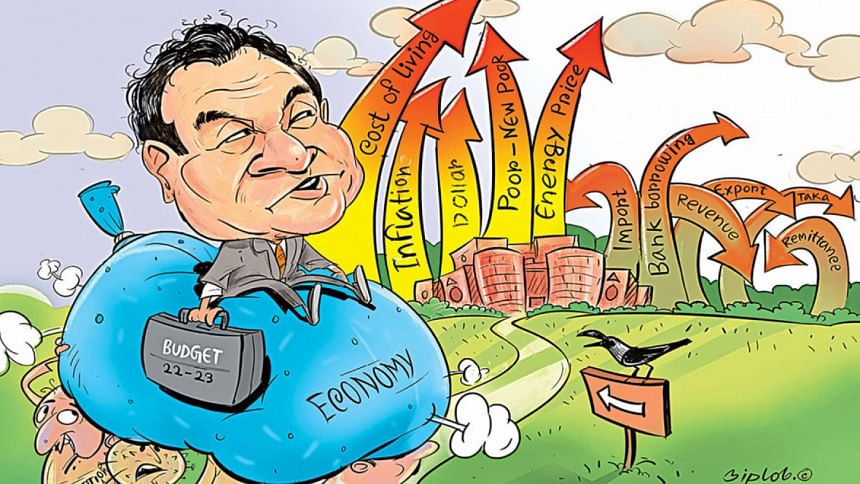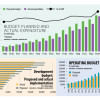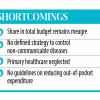Budget 2022-23: Bet on poor, future

What is the purpose of the national budget? In essence, it is to allocate scarce resources.
Deal with it wisely and not only would it bear fruit in the immediate future but also ensure more resources to spend for the future and more wealth to enjoy for all.
More than halfway into his tenure as the finance minister, AHM Mustafa Kamal has flattered to deceive in his handling of the budget.
But today, as he unveils his fourth budget in the backdrop of a cost of living crisis and looming LDC graduation, he has the floor to demonstrate that he has acquired a firm reading on the economy and knows precisely what to serve -- for now and for the future.
So, what should be on the menu?
For starters, there has to be a life raft for the millions of people struggling to keep their heads above water.
As many as 2.1 million have plunged into poverty for the runaway inflation since September last year, according to a survey by the Power and Participation Research Centre and the Brac Institute of Governance and Development on urban slums and rural areas.
Those people were just seeing their livelihoods bounce back with the reopening of the economy after roughing it for the best part of the past two years.
Would it be moral to let those people continue to live in extreme austerity and hunger?
The middle-class is not doing any better given the gas price increase and the impending hike in electricity and water tariffs.
Already, savings in the economy is at a five-year low as per the preliminary GDP data for this fiscal year, indicating people have been cashing in on their rainy day funds to get by.
This is truly an exceptional emergency and the budget for fiscal 2022-23 -- which, coincidentally, closes a few months before the next national election -- must have measures to address it even though those would come off as short-term political fixes.
For the poorest, there needs to be allocation in the budget to provide them with cash support of more than Tk 2,500.
In April, inflation hit an 18-month high of 6.29 percent, and given the raging Russia-Ukraine war and the weakening taka, the price level is unlikely to come down to a tolerable level anytime soon.
But the government is not entirely powerless in managing the pain.
For a brief period, the duties and taxes on the essentials, most of which are imported, can be withdrawn to hold back their prices.
In that way, the government would be extending universal support and snuffing out any fumes of stagflation, which is a scenario in which prices keep soaring while economic growth slumps.
But going forward, there needs to be an effective, long-term policy to protect the poorest from shocks.
If anything, the pandemic and global inflation have underscored the need to strengthen the underlying system so that fewer people are on the verge of a crisis the whole time.
At the same time, the 74-year finance minister must not lose sight of Bangladesh's graduation from the least-developed country bracket in 2026, for which groundworks are still in the rudimentary stage.
The preparations must take off in full swing from the incoming fiscal year, and it begins by investing in human resources.
The learning loss brought on by the 73-week school closure in Bangladesh, which was among the longest in the world, stands to take 4.9 percent off GDP by 2030, according to a recent study by the Asian Development Bank.
Only in Mongolia, Nepal and the Kyrgyz Republic in Asia were the impacts of school closures more severe.
In the upcoming fiscal year, it is essential that the government prioritises spending on education, which has historically been meagre.
Children who have dropped out of school during the pandemic must be brought back to classrooms through financial support and incentives.
For those still in school, effective learning programmes should be devised to offer appropriate support such as tutoring or special classes to bridge the learning gap, the ADB report said.
And for the youth already out of school, they must be given additional skills training.
Ample funding must be provided to equip the youth with digital skills and awareness, which can become a key driver for productivity and economic growth, according to the Manila-based multilateral lender.
And raising labour productivity is of the essence seeing that the duty benefits that Bangladesh currently enjoys would be evaporating not long after graduation.
Bangladesh's exports simply need to be competitive and varied vis-a-vis peers if the current trend is to continue once the safety guard of duty benefits come off.
Another side-effect of graduation is the loss of the option of concessionary loans from multilateral and bilateral lenders.
That means the government would have to rely more and more on local revenue mobilisation to fund its expenses to support its growth aspiration of becoming an advanced economy by 2041.
At south of 10 percent, Bangladesh's tax to GDP ratio is one of the lowest in the world, restricting the government's fiscal space for the present and for the future.
This must be remedied with urgency.
The tax administration must be automated and the tax policy needs to be streamlined and conducive to plug the longstanding ailments of leakages, corruption and evasion.
And the budget must have explicit references toward this direction. Otherwise, a rude awakening awaits the government.
The characteristic of a middle-income country is more and more people are employed in industries and services and fewer and fewer people in agriculture.
To prepare for the transition, farm mechanisation needs to take off in earnest in Bangladesh, and the budget must incentivise that well.
When Kamal, a chartered accountant, took charge as the finance minister for five years in 2019, he contended that he would be going great guns as "this was his subject".
So, for him, anything less than smooth graduation would mean he failed to score a distinction in his greatest exam. And his bid for that starts now.

 For all latest news, follow The Daily Star's Google News channel.
For all latest news, follow The Daily Star's Google News channel. 







Comments